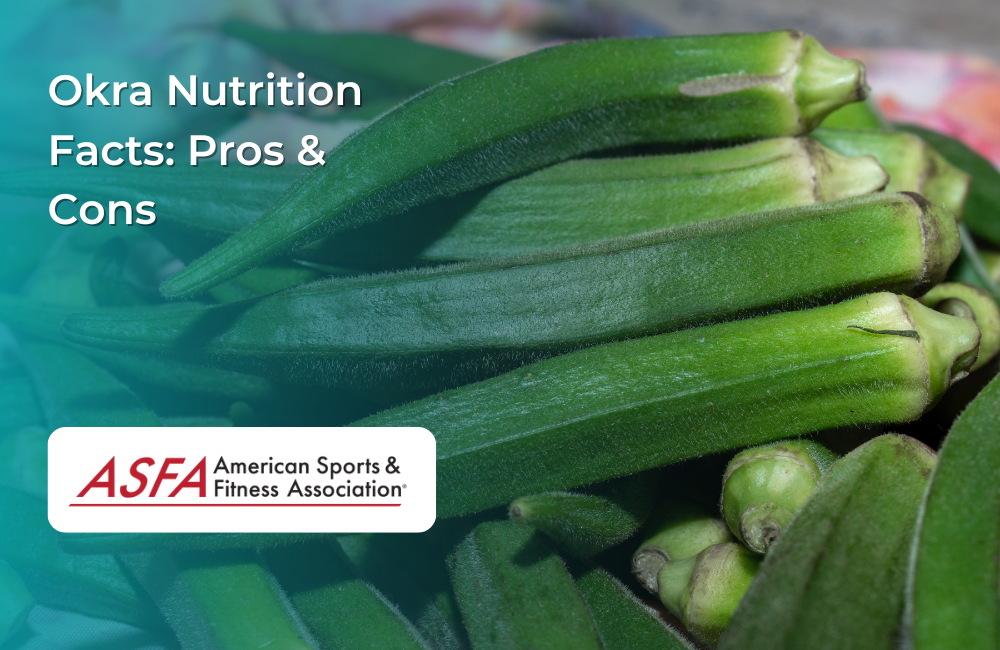Okra is a nutrient-dense vegetable known for its high fiber, antioxidants, and essential vitamins and minerals. It is widely used in Southern, African, and Asian cuisines and is valued for its digestive health benefits and low-calorie content. While okra offers several health advantages, its texture and potential digestive effects may not be suitable for everyone. Understanding the pros and cons of okra helps in making informed dietary choices.
Okra Nutrition Facts Pros Cons: Eating Okra
Okra is high in fiber, which supports digestion, regulates blood sugar levels, and promotes satiety. Its fiber content makes it beneficial for gut health and weight management. It is also rich in antioxidants, including polyphenols, flavonoids, and vitamin C, which help reduce inflammation, protect against oxidative stress, and support heart health.
Okra is a great source of vitamins and minerals, including vitamin K, folate, magnesium, and potassium, which contribute to bone strength, brain health, and muscle function. Vitamin K1 in okra promotes blood clotting and is important for individuals taking blood-thinning medications to consider, as it can interact with such medications. It is also low in calories and carbohydrates, making it a good option for weight management and low-carb diets. Additionally, raw okra is a rich source of vitamins, minerals, and antioxidants, making it a valuable addition to a healthy diet.
The mucilaginous texture of okra contains soluble fiber, which helps lower cholesterol levels and improve digestion by supporting gut-friendly bacteria.
Nutrition Profile of Okra
Okra is a nutrient powerhouse, offering a wide array of essential vitamins, minerals, and antioxidants. Just one cup of cooked okra packs a punch with 3.2 grams of dietary fiber, which is crucial for digestive health and maintaining stable blood sugar levels. It also provides 1.93 grams of protein and a mere 0.19 grams of total fat, making it a lean, nutritious choice.
In terms of minerals, okra is rich in calcium (82 milligrams), iron (0.62 milligrams), magnesium (57 milligrams), phosphorus (61 milligrams), and potassium (299 milligrams). These minerals are vital for bone strength, muscle function, and overall cellular health. Additionally, okra contains small but significant amounts of sodium, zinc, copper, and manganese, contributing to its comprehensive nutritional profile.
Moreover, okra is a fantastic source of vitamins A and C, both of which are essential for immune function, skin health, and overall well-being. Folate, another key nutrient found in okra, is crucial for healthy cell growth and development, making it particularly important for pregnant women.
Health Benefits of Okra
Okra is not just a versatile vegetable; it’s a nutritional gem with numerous health benefits. One of its standout features is its ability to support heart health by reducing the risk of blood clots and oxidative damage. The antioxidants in okra, including polyphenols and flavonoids, play a significant role in protecting the heart.
For those managing blood sugar levels, okra is a valuable ally. Its soluble fiber content helps slow down sugar absorption, aiding in blood sugar control and management. This makes it a beneficial addition to the diet for individuals with diabetes or those looking to maintain stable blood sugar levels.
Studies have shown that lectin from okra can inhibit cancer cell growth, particularly in human breast cancer cells. These studies demonstrate significant reductions in the growth and viability of human breast cancer cells, indicating a potential pathway for future cancer therapies utilizing natural food sources. However, more human research is needed to validate these findings and establish the role of lectin in cancer prevention and treatment.
Okra’s anti-inflammatory and antioxidant properties also contribute to overall health by combating oxidative stress and reducing inflammation. This can support brain health and cognitive function, making okra a brain-boosting food.
Additionally, the dietary fiber in okra promotes regular bowel movements and supports digestive health, while its low-calorie content makes it an excellent choice for weight loss and weight management.
Heart Health and Digestive Benefits
One of the unique features of okra is its mucilage, a thick, gel-like substance that can bind to cholesterol during digestion. This binding action helps lower total blood cholesterol levels, thereby reducing the risk of heart disease and stroke. Incorporating okra into your diet can be a heart-healthy choice that supports overall cardiovascular health.
The dietary fiber in okra also plays a crucial role in digestive health. It helps promote regular bowel movements, preventing constipation and supporting a healthy gut. By fostering a healthy digestive system, okra contributes to overall well-being and can help alleviate common digestive issues.
Additional Health Benefits
Okra is not just a tasty addition to your meals; it also offers a plethora of health benefits. For starters, okra is a fantastic source of calcium, which is essential for maintaining strong bones and teeth. This makes it a great choice for supporting bone health and preventing conditions like osteoporosis.
Moreover, okra contains anti-inflammatory compounds that can help reduce inflammation in the body. This is particularly beneficial for individuals suffering from conditions such as arthritis, as it may help alleviate symptoms and improve overall joint health.
Vitamin C is another key nutrient found in okra, playing a crucial role in supporting immune function. Regular consumption of okra can help boost your immune system, potentially reducing the severity and duration of colds and flu. Additionally, okra contains adaptogenic compounds that may help reduce stress and improve mood, making it a great food for mental well-being.
For those concerned about eye health, okra is a good source of lutein and zeaxanthin, two antioxidants that are important for maintaining healthy vision. These compounds may help reduce the risk of age-related macular degeneration, a common cause of vision loss in older adults.
Pregnancy and Breastfeeding
For pregnant and breastfeeding women, okra is a nutritional treasure. It is rich in folate, a vital nutrient that supports healthy fetal development and helps prevent birth defects such as spina bifida and anencephaly. Ensuring adequate folate intake during pregnancy is crucial for the health of both the mother and the baby.
In addition to folate, okra contains vitamin C, which is essential for immune function and overall health. Vitamin C supports the body’s ability to fight infections and aids in the absorption of iron, another important nutrient during pregnancy and breastfeeding. Including okra in the diet can help ensure that both mother and baby receive these essential nutrients.
Cons of Eating Okra
Okra contains oxalates, which may contribute to kidney stone formation in individuals prone to oxalate buildup. Its sticky texture can be off-putting to some people, making it less appealing in certain dishes.
Okra contains fructans, a type of carbohydrate that may cause bloating, gas, or digestive discomfort in individuals with irritable bowel syndrome (IBS) or sensitive stomachs.
Some commercially grown okra may contain pesticide residues, so washing it thoroughly or choosing organic okra can help reduce exposure.
Forms of Okra
Okra is a versatile vegetable that can be found in several convenient forms, making it easy to incorporate into your diet. Fresh okra is widely available in most supermarkets and can be used in a variety of dishes, from soups to stir-fries.
If fresh okra is not available, frozen okra is a great alternative. It retains much of its nutritional value and can be easily added to soups, stews, and casseroles. Canned okra is another convenient option, offering a shelf-stable solution that can be used in various recipes.
For those looking to get creative in the kitchen, okra powder is a dried and powdered form of okra that can be used as a thickening agent or added to soups and stews for an extra nutritional boost. Okra seeds are also valuable; they can be roasted and ground into a flour that can be used in baked goods or as a thickening agent in sauces and soups.
Cooking and Preparing Okra
Cooking okra can be a delightful experience, especially when you know the best methods to bring out its flavor and nutritional benefits. Boiling okra in water or broth is a simple way to prepare it as a healthy side dish. Steaming is another excellent method that helps preserve its nutrients and natural flavor.
For a quick and tasty option, try sautéing okra with garlic and onions. This method adds a delicious depth of flavor and is easy to prepare. Frying okra is a popular method in the Southern United States, offering a crispy and flavorful treat.
Roasting okra is another fantastic way to enjoy this vegetable. Roasting brings out its natural sweetness and can be enhanced with herbs and spices for added flavor. Each of these cooking methods offers a unique way to enjoy okra while retaining its many health benefits.
Tips for Incorporating Okra into Your Diet
Incorporating okra into your diet can be both fun and rewarding. If you’re new to okra, start with small amounts and gradually increase your intake to get accustomed to its unique texture and flavor. Experimenting with different recipes can also help you discover new and exciting ways to enjoy okra.
Adding okra to your favorite dishes is a great way to boost their nutritional content. It can be included in classic recipes like gumbo, jambalaya, and even fried chicken. Okra also works well as a thickening agent in soups and stews, thanks to its mucilaginous texture.
For a refreshing twist, try making okra water. Simply soak okra in water overnight and enjoy a healthy, hydrating beverage the next day. This is an easy way to reap the health benefits of okra without much effort.
By following these tips, you can easily incorporate okra into your diet and enjoy its many health benefits, from supporting heart health and blood sugar management to aiding in weight loss and promoting brain health.
Maximizing the Health Benefits of Okra
To fully reap the many health benefits of okra, consider incorporating it into your diet in various forms. You can enjoy okra cooked, raw, or even as a powder. Consuming raw okra is particularly beneficial as it is a rich source of vitamins, minerals, and antioxidants. Cooking okra in different ways, such as roasting, grilling, or stir-frying, can help reduce its slimy texture while preserving its nutritional value.
Okra seeds are another valuable part of the plant, offering a source of oil and protein. Adding okra to soups and stews not only thickens the dish but also boosts its nutritional content. Okra can also be used as a natural remedy for digestive issues and inflammation, thanks to its mucilage and fiber content.
Remember to consume okra in moderation as part of a balanced diet to maximize its health benefits. By doing so, you can enjoy the many advantages this nutrient-rich vegetable has to offer, from supporting heart health and blood sugar management to aiding in weight loss and promoting brain health.
Conclusion
Okra is a nutrient-rich vegetable that provides fiber, antioxidants, and essential vitamins, making it beneficial for digestion, heart health, and weight management. However, its sticky texture, oxalate content, and potential digestive effects may not be suitable for everyone. Cooking okra in different ways, such as roasting or grilling, can help reduce its slimy texture while still retaining its nutritional benefits.
FAQs
Is okra good for weight loss?
Yes, okra is low in calories and high in fiber, making it a great choice for appetite control and weight management.
Can okra help with blood sugar control?
Yes, okra contains soluble fiber, which slows sugar absorption and may help stabilize blood sugar levels.
Is okra good for kidney health?
Okra contains oxalates, which may not be suitable for individuals prone to kidney stones.
What is the best way to cook okra?
Roasting, grilling, or stir-frying okra reduces its slimy texture while preserving its nutrients.
Can okra cause digestive issues?
For some individuals, okra's fiber and fructans may lead to bloating, gas, or mild digestive discomfort, especially in those with IBS or sensitive stomachs.





